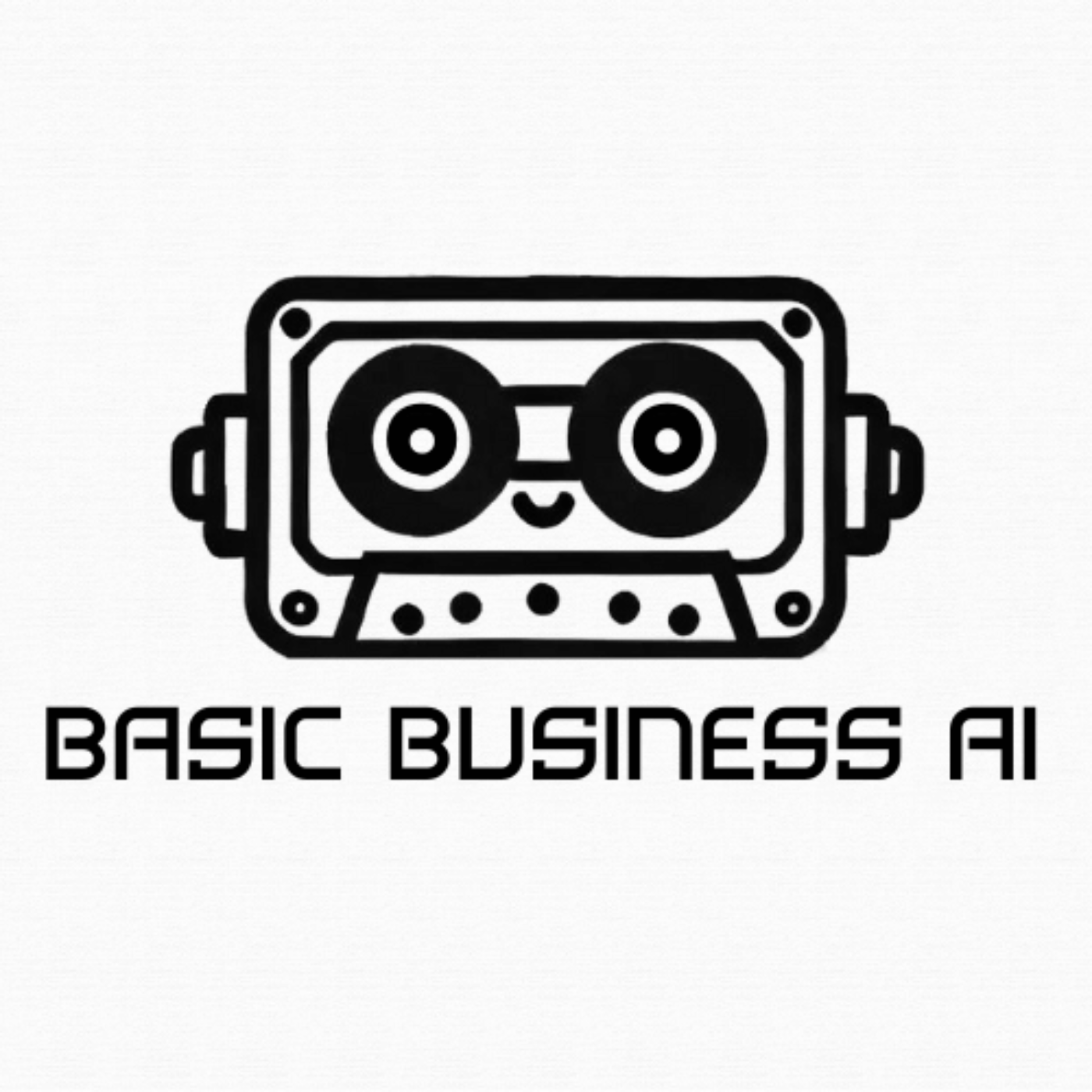[00:00:00] Speaker A: Welcome to Basic Business AI, a podcast dedicated to simple AI strategies for businesses who don't want to get an advanced tech degree or hire some marketing bro. I'm your host, Ana Gonzalez and you can find me on social media at annabotprime. We bring on regular business owners like you and me to discuss practical strategies, ideas and perspectives about AI without getting too far into the weeds of the tech bb. AI is sponsored by annabots. Did you know companies that respond to customer inquiries in less than 1 minute have a 400% higher chance of closing the deal? Our AI powered assistants have an average response time of just 5 to 7 seconds, meaning you can close more sales without generating more leads. No tech skills are needed and you can get started in less than five minutes. Go to annabots AI to learn more. Once more, that's annabots AI. Today's guest is Barry K.
Barry has consulted and trained more than 10,000 small business owners as well as delivered over a thousand seminars and workshops to small businesses across the United States. His presentations demonstrate proven business growth and marketing tactics using real world examples and case studies to help small businesses, others and nonprofits expand their activities successfully. We also have helped countless small businesses expand by putting in place effective, high quality personnel and systems to utilize people correctly and scale their business. Love it. So, Barry, thank you for coming here. Welcome to Basic Business AI.
[00:01:36] Speaker B: Thanks, thanks for having me. I really appreciate it.
[00:01:39] Speaker A: So from your perspective, how is AI reshaping the future of your industry?
[00:01:45] Speaker B: Well, I mean, it's interesting because I think with my industry, there are a lot of people that. Well, it's been this way for computers for a long time where people don't, people are scared of computers. There's certain people that are just like. And they're, they're not, it's not even. I mean, they must be scared of it because they won't take the time to learn it. And so they, so they especially older generations who are unfamiliar. So we've got all these baby boomers and such, right? I'm not quite a baby boomer, but I'm in that direction. And they haven't taken time to figure out and learn the technology. They can't sit down at a computer. They get befuddled. They're not, they're not facing up to it. They're not having fun with it. They have confusions regarding it. They're. They have losses. They figure they can't, they're too far behind all the different things that they had with computers.
[00:02:39] Speaker C: Right?
[00:02:40] Speaker B: And they've had that with computers since the 1990s, right. Some of them are just stuck there since the 1990s. And now we add to that AI and it's the same thing, right? And then you add on top of that the fact that with AI they think that they don't know what AI is. They hear all the horrible things about AI. They've seen the Terminator films, right?
[00:03:13] Speaker A: Yes.
[00:03:14] Speaker B: Well, you know, I mean, you know, I mean, it's like, I mean, you know, but AIs are programmed by people. And so if an AI is evil, that's because there would be an evil programmer behind the AI. So it's not far fetched that you could have a Terminator situation if you had some evil people in charge of the war machine. I mean, it's a, I mean fictional, right? If you had evil people in charge of the war machine in the world and if they had control of all the nuclear weapons and if those same individuals were controlling AI, maybe there would be a problem. And anyway, whatever.
So, I mean, so maybe their fears are founded to some degree, but then there are other people. Like they're also, there's, there's. Fortunately the majority of the population is good. You know, there's a small percentage of the population that is, that is psychotic. You know, you might say they act psychotic. They're all about murder and war and they want to hurt people. And those, those make up a 20% of the population and only 2 1/2% of those people are truly dangerous.
[00:04:24] Speaker C: Right?
[00:04:25] Speaker B: Those are your Hitlers, your Dillingers and whoever else in the world, right. So those individuals need to be kept away from AI. And then fortunately we have 80% of the population who is actually good and will use, and will and will seek to use AI to help people.
[00:04:44] Speaker C: Right.
[00:04:45] Speaker B: So I think it's important for the rest of us that we, you know, like one of the things that's basically caused a downgrade in culture in general, which you could apply to AI.
I have this book called the Way to Happiness that I promote.
[00:04:58] Speaker C: Right.
[00:04:58] Speaker B: It's a, it's common sense guide to better living and we, we use it in schools. It's a non religious book, Right. Booklet and there's a video and a film that people can check out online on YouTube.
But the way you should, I should give you a link to their website, the way to happiness.comorg.
there's a free course.
[00:05:17] Speaker A: Oh, nice.
[00:05:18] Speaker B: And then I think anybody who's dealing with AI should do that course because the book teaches a few different things which has to be integrated into the Work and I'll tell you, I'll answer your question. Right. But I think this preamble to your question is super important.
[00:05:32] Speaker C: Right.
[00:05:33] Speaker B: So. Because how does it affect my industry?
[00:05:35] Speaker C: Right.
[00:05:37] Speaker B: Because the effects are incredible if used with the. With these principles in mind.
[00:05:42] Speaker C: Right.
[00:05:43] Speaker B: Respect for others.
[00:05:45] Speaker C: Right.
[00:05:45] Speaker B: The booklet emphasizes treating others with respect which can be translated into how AI systems are used to impact people's lives. For instance, AI should be deployed in ways that promote fairness and respect for human dignity.
[00:05:59] Speaker C: Right.
[00:06:00] Speaker B: Take care of yourself.
Ethical AI must include safeguards that ensure its actions do not harm individuals or society. This mirrors the principles in the book the Way to Happiness. Principles of safeguarding one's own well being and others.
[00:06:16] Speaker C: Right.
[00:06:17] Speaker B: Be competent, ensuring AI systems are well designed and free from critical flaws related to the principle of competence and work and life. And then finally, one more example. Seek to live with the truth.
[00:06:30] Speaker C: Right.
[00:06:31] Speaker B: AI systems should be used to promote truth and honesty and avoid manipulation of misinformation which aligns or the principles and the Way to Happiness.
[00:06:40] Speaker C: Right.
[00:06:40] Speaker B: So if you. Ethics is where it all starts. Ethics is where it has to start with the individual and you have to. And then it translates into proper technology and pro. And I think you believe that too with the books that you read like Art of War. Art of War says to win without fighting is best.
[00:06:58] Speaker A: Yes.
[00:07:00] Speaker C: Right? Yes.
[00:07:01] Speaker B: That's what war is all. That's what the Art of War is all about. To win without fighting is best. Shen Tzu would not. Shen Tzu was not a warmonger. He was a gentleman who cared about people and he wanted to and he did not. And war was used as a tool to protect the lands that he cared for.
[00:07:23] Speaker C: Right.
[00:07:23] Speaker B: He was a good person who wrote a book called the Art of War.
[00:07:27] Speaker A: It just happens to have an amazing hook.
[00:07:30] Speaker B: Yeah, it's a great hook. And it's. I mean it's about. But you can use it in legal warfare conversation, you can use it it in business. It can be translated to many different things. Right. It's a fantastic book. I've read it many times as fast. I have not read the Five Rings. I'd recommend that we should put a link in the thing for people as well as a link for the Way to Happiness so people can check it out. But the way it's transformed my industry is tremendous. It's basically done a couple different things.
If people are trained on it and they're trained on now, the next thing is after they're trained on ethics, they need to be trained on administration, they need to be Trained on business, they need to be trained on the basics of their craft. They need to know the fundamentals of their craft so well that they know the questions to ask and how to direct AI with regards to its answers. For instance, I'm in marketing, right. It's one of the many things that I do. I also help businesses grow using my virtual assistant company.
But this morning, and so one of the things we do at my virtual assistant company is we book people on podcasts. So I book people on other people podcasts and I had an assistant that booked me on this podcast, and that's one of the things I do.
[00:08:43] Speaker C: Right?
[00:08:44] Speaker B: And so I use. Now I teach talks, I give talks on how to do podcast guesting is what we call it. So you can get out there and you can, you can talk and you can present your ideas and all of that, right? So I also, I'm very trained in marketing and there's a great book in marketing which you would love. Actually, we're going to recommend it for you. Right? Another book recommendation. It's by. Yeah, here we go. It's by Reese and Trout.
And it's called the positioning era, the battle for your mind.
[00:09:17] Speaker C: Right?
[00:09:18] Speaker B: And in positioning, you want to create instant familiarity by placing your product alongside something else. Image, an idea, a concept, so that instantly people know what you're talking about.
[00:09:36] Speaker C: Right?
[00:09:37] Speaker B: We do this all the time. Like with movies. We say, well, it's like a James Bond movie, but set in the future with robots.
[00:09:44] Speaker C: Right?
[00:09:45] Speaker B: That's a great pitch for the movie, right?
Yeah. Which one is James Bond? A robot. I want to know.
So it. Is there a ghost in the machine? So, yeah, we find out, we want to ask about these things, we might use it. That's what positioning is. It creates an instant familiarity and a curiosity. So I asked, I told AI a bunch of these things, what books I was basing my marketing campaign on. And I said, create a campaign for me on.
For my podcast guesting program. And we're going to use the positioning of the. The Rat pack, Sammy Davis Jr. Frank Sinatra, Dean Martin, and then Joey Bishop. These are all singers. And then occasionally Jerry Lewis, who is a. Who is a sidekick, right. So to speak. And we create a whole campaign, advertising, marketing, social media posts, everything, all associated with this, you know, these guys because I'm teaching it to, you know, older people who know who the Rat Pack are. Right. If you don't know, Google it. That's what the Internet's for.
Listen to a couple of their songs and then, you know, basically, I'M presenting this to these people, and I'm presenting it with the interesting promotion that they would find fascinating. And it took me 30 minutes to put together a whole marketing campaign with checklists that my people can implement. And then we're teaching my people how to use AI for the people that are too scared to use a computer.
[00:11:22] Speaker C: Right.
[00:11:23] Speaker A: Yes.
[00:11:23] Speaker B: And therefore, AI is never going to be what they use. So how has it changed it? I mean, it makes me extremely more valuable, but only because I have ethics and only because I understand my craft.
[00:11:41] Speaker A: I absolutely love all of this. And I think that everything sprouts from ethics. From having ethics and from having your core values well defined and knowing what you want and where you want to go, that's when you close the gap.
[00:11:59] Speaker B: Right.
[00:12:00] Speaker A: And that's when. Where everything just, like, grows.
I love. Also, it's funny that you mentioned the Terminator, like, started the fear towards AI or like HAL 9000 in the 60s.
But.
[00:12:19] Speaker B: Arthur C. Clarke's an incredible author, by the way. He's a scientist. He developed satellites. That. He developed satellites.
[00:12:26] Speaker C: Right.
[00:12:27] Speaker B: You can't say somebody was just a science fiction author because you have no clue. Arthur C. Clarke designed satellites.
[00:12:34] Speaker C: Right.
[00:12:34] Speaker B: Anyway, go ahead. I'm sorry.
[00:12:37] Speaker A: I was going to say that everything that is new in humanity has been scary. Like, electricity was scary. Cars were scary. Like, oh, why would I need a car if I have a perfectly fine horse? Why would I like a mechanic horse?
Internet, cell phones. Now we have a. Now we have electric cars who. Where we can call our families through the cell phone with the Internet in there, like, moving. And they drive us without even just doing anything. So every single thing that feels new drives fear. But AI has been here for seven years. AI has a. Is a term that was coined in 1956. What changes the accessibility to the public. So I love that you're teaching that to people so that they can be the most productive right now or that they can apply to their daily lives.
[00:13:30] Speaker C: Right.
[00:13:30] Speaker A: Because AI is everywhere, even if we don't notice. Like, did Netflix tell you last night what movie you should watch? It's a little bit of AI. So I. I love all of that. So, Barry, tell us who you serve and how people can reach out to you.
[00:13:46] Speaker B: Sure. Yeah. You can reach out to me with basically, teambuilders Agency. That's the website. Teambuilders Agency.
That's my company where I provide virtual assistants that are trained in AI, that people that are working with you. For instance, you help people with AI, and then your customers need a person to take that work off their plate. Because imagine if AI could help me do 10x my work productivity. Well, now what if I have 10 people that I have my AI help 10x them. Now all of a sudden I'm a. I'm a. I'm a company of 100 people, even though I only have 10.
[00:14:36] Speaker A: How do you manage the quality and the deliverability? That's such a hard word for me. And. Yeah, how do you manage the growth? Yes.
[00:14:45] Speaker B: Right. Yes. And there has to be somebody in charge of that who then reviews what the output is, even if it's AI output. Right. Because the rule number one rule is we don't trust AI. I mean, it's not that AI is not trustworthy, it's just that I don't trust this keyboard to help me today, necessarily.
[00:15:08] Speaker C: Right.
[00:15:08] Speaker B: I mean, I feel like this tool will help me and I count on this keyboard. So I guess there's a little bit of trust. But it's like. But if I. But I don't go and like go, you know, if this keyboard's messing up, then I change, I change my mind instantly. And I have to. And I can. And I have to look and observe and it has to start with observation of what it's doing. If I hit Q and it's constantly pushing L, I instantly do not trust this keyboard.
[00:15:38] Speaker C: Right.
[00:15:38] Speaker B: I trust it all the way up to the point where it's not worthy of trust anymore because it's not a person. And I guess people are the same way, but I don't necessarily like, you know, buy a new person.
[00:15:51] Speaker A: I love this. This has been an amazing conversation. I've enjoyed it so much. But we need to wrap from here. Thanks to our guest, Barry Kazayer for joining us for a practical conversation about AI and its potential for business. You can learn more about what he does by visiting Timbuilders agency. Is that right?
[00:16:08] Speaker B: That's right. That's right. And I will contact us through there and I will. You'll talk to me.
[00:16:15] Speaker A: Yay. So if you run a business of any size and you have some ideas or strategies around the topic of AI, we'd love to have you on for a future episode as well. We interview business owners of all levels of experience and exposure to AI so we can represent all voices, especially the 90% of us who are curious about AI but not trying to be tech geniuses. Apply for a future episode by going to basicbusinessai.com and one more time, if you want to install a 24.7ai sales and support team for less than 10% of the cost of a single employee. Get yourself an Anabot. Learn
[email protected] See you next time on Basic Business.AI oh, and by the way, if you like this episode, tell your friends. See you later.



